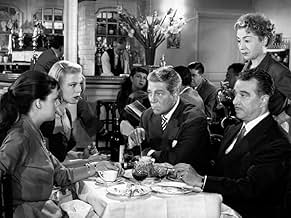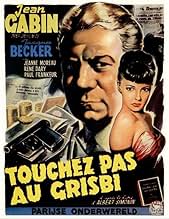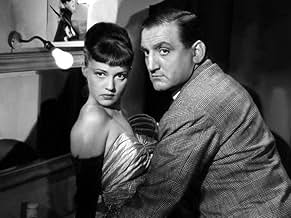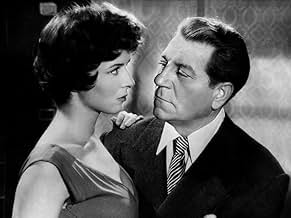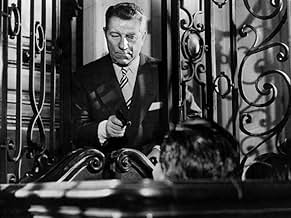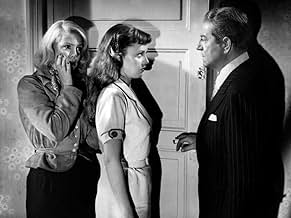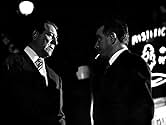ÉVALUATION IMDb
7,7/10
8,8 k
MA NOTE
Ajouter une intrigue dans votre langueAn aging, world-weary gangster is double-crossed and forced out of retirement when his best friend is kidnapped and their stash of eight stolen gold bars demanded as ransom.An aging, world-weary gangster is double-crossed and forced out of retirement when his best friend is kidnapped and their stash of eight stolen gold bars demanded as ransom.An aging, world-weary gangster is double-crossed and forced out of retirement when his best friend is kidnapped and their stash of eight stolen gold bars demanded as ransom.
- Prix
- 1 victoire et 1 nomination au total
Marilyn Buferd
- Betty
- (as Marilyn Bufferd)
Paul Barge
- Eugène
- (as Barge)
Alain Bouvette
- Le chauffeur de taxi
- (as Bouvette)
Histoire
Le saviez-vous
- AnecdotesFilm debut of Italian ex-wrestler Lino Ventura.
- GaffesWhen the submachine guns are removed from the wine box, they are Sten Submachine guns. When they are removed from the car after the ambush they are Sten Guns. When they are finally shot at the retreating gangsters, they have become two different models of Thompson Submachine guns, an early civilian model of a Thompson and a military model (M1 or M1A1) of a Thompson.
- ConnexionsEdited into Histoire(s) du cinéma: Une vague nouvelle (1999)
Commentaire en vedette
Like his masterpiece, 'Le trou', this film embodies Becker's distinctive vision of the world. We are given a portrait of a bond of love between two men--a kind of love which is beyond anything a man and a woman can know. But this is not Oscar Wilde's 'love which dare not speak its name': there is no hint of homoerotic sexuality. Rather, this is the bond of the trenches and the workplace (presumably class and underworld trenches in the case of the protagonists), a theme which has a tremendous atavistic resonance in French culture and history insofar as it reflects a collective male experience extending from the Napoleonic Wars through the Paris Commune down through WWI--the kind of camaraderie for life which predisposed a man to sacrifice all that he holds dear for another man (another instance of this is in Jean Vermillon's 'Gueule d'amour'), and hinted at in a sentimental, nuanced way when Max breaks out the foie gras and a bottle of blanc after his buddy has made a costly bonehead move. Note also that incredible sigh of utter lassitude that 'Max' (Jean Gabin) heaves as he sits through yet another girly show--or that look on his face as 'Betty' asks him if he loves her (after he's slept with her)--a look which tells us his every thought is on his pal, 'Riton'. This is not to say that women are portrayed throughout in a disparaging light: "Mme. Bouche", the owner of the restaurant and 'Marinette', the nightclub owner's wife (a wonderfully subtle portrait of uxorial solicitude and anxiety) are both characters who reinforce and serve male solidarity. But there's the suggestion that when the male/female bond involves sexuality, a guy can lose his head and forget about his mates.
This male/female divide appears to overshadow class divisions, which were to be at the heart of Becker's 'Le trou.' Still we can see Becker's communist sympathies coming through in oblique ways. Max is the engaging, attractive character that he is because of his fierce devotion to others, his liberality of spirit (after he leaves a huge tip to the petit-bourgeois owner of the cafe' in the process of recycling leftover wine, the latter remarks, 'We could use more customers like him'), the value he places on his pal's life over the loot, the easy way he has with trusting and receiving the trust of others--all these things are non-commercial values and they suggest a world and way of life alternative to what America has in store for France. Note, for example, how the camera lingers on the road sign at the scene of the first shootout: 'Autoroute a' l'ouest', 'Expressway to the west'. It's the same road Max and his pals rush down and that takes them straight to the disaster with the loot. The promise of riches that America ('the West') tantalizingly dangled before the French in the form of the Marshall Plan was not to be taken up without heavy costs. Pauvre Max: in the end he cannot cry at the loss of his buddy (though I cried for him): he cannot express his grief because he is now in the company of "Betty", his American doll and source of support (fittingly played by a real-life Miss America of 1946).
Sure made me feel as though I should have spent more of my life in France.
This male/female divide appears to overshadow class divisions, which were to be at the heart of Becker's 'Le trou.' Still we can see Becker's communist sympathies coming through in oblique ways. Max is the engaging, attractive character that he is because of his fierce devotion to others, his liberality of spirit (after he leaves a huge tip to the petit-bourgeois owner of the cafe' in the process of recycling leftover wine, the latter remarks, 'We could use more customers like him'), the value he places on his pal's life over the loot, the easy way he has with trusting and receiving the trust of others--all these things are non-commercial values and they suggest a world and way of life alternative to what America has in store for France. Note, for example, how the camera lingers on the road sign at the scene of the first shootout: 'Autoroute a' l'ouest', 'Expressway to the west'. It's the same road Max and his pals rush down and that takes them straight to the disaster with the loot. The promise of riches that America ('the West') tantalizingly dangled before the French in the form of the Marshall Plan was not to be taken up without heavy costs. Pauvre Max: in the end he cannot cry at the loss of his buddy (though I cried for him): he cannot express his grief because he is now in the company of "Betty", his American doll and source of support (fittingly played by a real-life Miss America of 1946).
Sure made me feel as though I should have spent more of my life in France.
- palmiro
- 14 févr. 2004
- Lien permanent
Meilleurs choix
Connectez-vous pour évaluer et surveiller les recommandations personnalisées
- How long is Don't Touch the Loot?Propulsé par Alexa
Détails
- Date de sortie
- Pays d’origine
- Site officiel
- Langue
- Aussi connu sous le nom de
- Grisbi
- Lieux de tournage
- sociétés de production
- Consultez plus de crédits d'entreprise sur IMDbPro
Box-office
- Brut – États-Unis et Canada
- 131 548 $ US
- Fin de semaine d'ouverture – États-Unis et Canada
- 21 674 $ US
- 7 sept. 2003
- Brut – à l'échelle mondiale
- 131 548 $ US
- Durée1 heure 36 minutes
- Couleur
- Rapport de forme
- 1.33 : 1
Contribuer à cette page
Suggérer une modification ou ajouter du contenu manquant

Lacune principale
By what name was Touchez pas au grisbi (1954) officially released in Canada in English?
Répondre
![Regarder Bande-annonce [OV]](https://m.media-amazon.com/images/M/MV5BMDdjNGE5Y2QtMDQ4My00M2Q3LTgwMGYtMjYxMzNlNmY1MTlhXkEyXkFqcGdeQXRyYW5zY29kZS13b3JrZmxvdw@@._V1_QL75_UX500_CR0)
